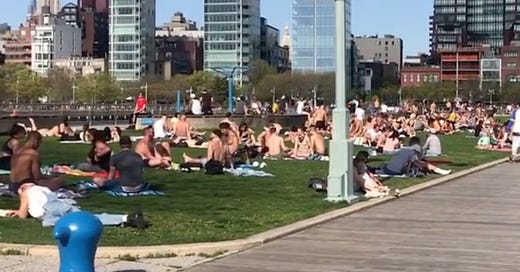Don't Be a COVID Cop
The powerful are the only ones who benefit when we go all Big Brother on each other.
It seems like everyone these days has become a COVID cop. The social media posts from ordinary people around the world bristling with outrage as their fellow citizens crowd into parks in apparent defiance of social distancing measures have almost become a cliché during the coronavirus pandemic.
I get where the freakouts are coming from. I really do. I have become intimately familiar with the dread that now seeps into my pores when I go out for a walk in the park and am met by crowds. I’ve lost track of the number of times I’ve seethed at someone who won’t get out of the way. It’s intensely frustrating when you encounter someone who isn't even trying to do the right thing, and people have every right to be pissed off about it.
But, setting aside the fact that those infamous pictures often distort the amount of social distancing violations actually taking place, the solution to these problems is not for everyone to start turning each other in. When people become COVID cops, they do several very damaging things.
In the immediate term, they ensure that maintaining social distancing becomes an issue of official government enforcement and policing. We know where that leads — to an exacerbation of the state's racist and classist handling of everyday life. Black people across the country are being disproportionately arrested, fined, and harassed for social distancing violations. Here in New York, the disparities are clear to anyone with eyes. The public housing projects in my neighborhood are under constant watch from NYPD cops sitting in cars and shouting at people in the street; move away from the projects and the cop cars magically disappear.
The NYPD has done its usual thing and gone absolutely nuts across the city, brutally beating enough people of color in the name of social distancing that even Bill de Blasio had to pretend to care. His solution, though, was to increase the number of "social distancing ambassadors" in the city, and also to cut off access and ramp up surveillance of some parks downtown where a lot of white people gather — that is, to gesture at a more holistic solution while also escalating law enforcement and depriving people of vital green space in the name of equality. (He also said that the NYPD was "saving lives" by arresting people, which, swing and a miss.)
It should go without saying that people shouldn't be encouraging this kind of behavior from the state. But there are deeper perils to everyone going full COVID vigilante.
One is that the time we all spend getting angry at each other is time we should be spending getting angry at more important targets, like our elected officials. There is of course a level of personal responsibility that we all must take right now, but personal responsibility is not a substitution for concerted government action.
I live in Manhattan, the most densely populated place in the United States. My local park is Central Park, the most-visited green space in the country. There are simply too many people here, and too little space, for everyone to be six feet apart from each other at all times. It doesn’t work.
The New York City government could be helping me and everyone around me by dramatically expanding the available space in the city by closing streets to cars. Places like Seattle looked at the benefits this brings and decided to permanently close some streets to cars. Rather than seize this opportunity, though, de Blasio had to be forced into rolling out a street closure plan that he is carrying out in glacial dribs and drabs, and is telling his own constituents that he doesn't trust them to handle the new situation. It would be very useful if people took some of the ire they are reserving for each other and pressured de Blasio to go further instead. (Some of this focus should also be trained on Andrew Cuomo, who has sky-high approval ratings despite an objectively catastrophic failure to rein in the COVID crisis, and who gets more and more odious by the day.)
But it goes beyond even that. Coronavirus is not only a crisis of unprecedented magnitude; it's also a dress rehearsal for the future. Our relationship to each other — our borders, our welfare state, our level of comfort with ever-more-intrusive surveillance, our tolerance of mass suffering and inequality — will be irrevocably altered by this crisis. The devastation that will be wrought by climate change is barreling towards us, and it will trigger the exact same issues currently being triggered by the coronavirus — only on a far greater scale. The choices that we make now will bear directly on how we handle that crisis. What we do right now really, really matters. If people veer towards a hyper-individualistic response, and decide that it's more important to go all Gestapo on each other than to build networks of solidarity and work to force the kind of major change that will eventually be needed to ensure our survival on this planet, we are doomed. If, on the other hand, people look out for each other, and train their anger and their determination where it really should be trained, who knows? Maybe we'll make it out of this hellscape someday.





